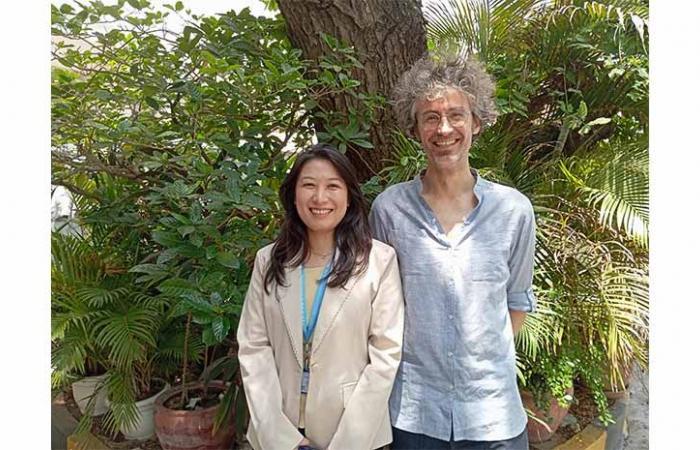Antibiotic resistance, or antibiotic resistance, is considered one of the major public health problems worldwide, and even one of the major crises to come, due to the development and progressive selection of an increasing number of bacteria resistant to antibiotics. This concerns not only France, where we are all familiar with the campaigns promoting the rational use of antibiotics as ” Antibiotics are not automatic “, but this is even more true in many countries in the South, particularly Cambodia, where antibiotic resistance is even more significant. This has direct consequences on the chances of recovery of patients when they are infected with bacteria requiring antibiotics, and this constitutes a real challenge for doctors in the care of these patients.
One of the main drivers of the emergence of antibiotic resistance is the misuse of antibiotics. This is why, in all hospitals worldwide, programs are gradually being put in place to monitor the evolution of antibiotic resistance and promote the proper use of these drugs. In particular, they aim to encourage doctors to choose the right antibiotic for the right indication, while limiting, if possible, the use of molecules with the broadest spectrum of activity. The objective is to be effective against the bacteria responsible for the infection while minimizing collateral damage to the rest of the bacterial flora.
In Cambodia, a Franco-Cambodian team led by two researchers, Dr Kennarey SEANG and Dr Stanislas REBAUDET, has just launched a project called “I am R”, funded by France.
Stanislas Rebaudet is an infectious disease specialist working at the European Hospital of Marseille. As a clinician, he is confronted daily with antibiotic resistance and the challenge of choosing antibiotics in the treatment of these infections. He is also a public health researcher, affiliated with Aix-Marseille University, Inserm (National Institute of Health and Medical Research) and IRD (Institute of Research for Development). His research laboratory focuses in particular on the use of artificial intelligence in the health fields.
Ms. Kennarey NOTHING is a pediatrician by training, having completed part of her training in France for two years. Subsequently, she specialized in epidemiology in California. Currently, she works at the University of Health Sciences of Cambodia (UHS), in the research grants management office. Her role consists of developing research projects, submitting them for funding and supervising their implementation. As an epidemiologist, she contributes to the scientific valorization of research results by participating in the writing of scientific articles and presenting the findings at conferences and symposia.
Le Petit Journal met them and was able to ask them questions about their research project.
Le petitJournal: what is the “I am R” project?
The “I am R” project is a multidisciplinary French-Cambodian initiative to combat antibiotic resistance in Cambodia using artificial intelligence tools. The project name, “I am R,” is a play on words that combines the concepts of antibiotic resistance (AMR) and artificial intelligence (AI).
The main objective of the project is to provide Cambodian health practitioners with a computer-based tool that can effectively guide antibiotic choice while waiting for laboratory test results. To achieve this, the project is first collecting and analyzing a large amount of data on antibiotic resistance in Cambodian health facilities, initially focusing on Calmette Hospital in Phnom Penh. Using advanced artificial intelligence and machine learning techniques, the project team is developing models that can predict the susceptibility of bacteria to antibiotics based on historical data. These models will be integrated into a smartphone-based computer application, allowing health practitioners to make informed decisions about antibiotic choice in real time, while waiting for laboratory test results.
The “I am R” project aims to improve the management of bacterial infections in Cambodia by reducing the inappropriate use of antibiotics, thereby contributing to the fight against antibiotic resistance, a growing global public health problem.
LPJ: Are there any specific features specific to Cambodia in the face of antibiotic resistance?
Peculiarities in the way antibiotics are prescribed and used in Cambodia are roughly comparable to those in many developing countries. For example, self-medication is a widespread practice. Patients obtain antibiotics without a doctor’s prescription. This practice may be motivated by various factors, such as limited access to health services, reliance on self-diagnosis, or the relatively low cost of medicines.
In addition, specific challenges related to the availability and quality of antibiotics are also problems faced by the health system in developing countries. In some regions, particularly rural areas of these countries, access to medicines may be limited due to geographical distance from health facilities or shortage of medical resources. In addition, the quality of available antibiotics may vary, with counterfeit or substandard medicines sometimes present on the market.
Regarding the prescribing practices of Cambodian physicians, like those in developing countries, they may be influenced by various factors, such as medical training, current clinical protocols, and socioeconomic pressures. Physicians may be led to prescribe antibiotics more cautiously due to the high prevalence of antibiotic resistance, or conversely, to overprescribe them due to pressure from patients or misperceptions of their effectiveness.
In summary, understanding these prescribing practices is essential for developing effective interventions to promote appropriate antibiotic use and combat antibiotic resistance in the country.
LPJ: What are the main difficulties you face?
This project opens the way for in-depth reflection on the practical, logistical and scientific challenges that the research team faces in its implementation:
- Access to data : One of the major difficulties may be access to relevant data to feed the artificial intelligence model. In the case of our project, the team must collect data from Calmette Hospital. Because not all medical data is computerized, we will only work on the results from the bacteriology laboratory, which nevertheless constitute the most important information. We will not be able to integrate other data such as diagnoses, antibiotic treatments administered, etc.
- Data cleaning : Once the data is obtained, an additional challenge will be to prepare it for analysis. This requires computer science skills to structure the data in a way that it can be used effectively to train the artificial intelligence model.
- Modeling and machine learning : the core of the project then lies in the development of an artificial intelligence model capable of predicting the sensitivity of bacteria to antibiotics. This involves the selection and development of appropriate machine learning algorithms, as well as their training on the available data. In Marseille, we are already working on this aspect and specific models for Cambodia will be developed in collaboration with the team on site.
- Application Development integrating these artificial intelligence models that meet Cambodian challenges and the expectations of future users on site. A crucial challenge will be to ensure that the developed tool is adopted and used by practitioners in their daily clinical practice. This will require a user-friendly and intuitive user interface, as well as appropriate training and support for physicians in using the tool. It may be necessary to overcome resistance to change to ensure successful adoption.
- Sustainability and scale: Once the pilot project is successful, an additional challenge will be to ensure its sustainability and expansion to other health facilities in Cambodia and potentially other countries. This will involve strategic partnerships, advocacy efforts, and long-term investments in local health and information technology capacities.
Overcoming these challenges will require close collaboration between researchers, health practitioners, policy makers and local communities to implement innovative and effective solutions to combat antibiotic resistance.
LPJ: What is your budget?
The project is funded by a €100,000 grant from the French Ministry of Foreign Affairs. This budget covers the expenses related to the implementation of the one-year pilot project. The funds are allocated to various aspects of the project, including data collection and analysis, development of the IT tool, training of health practitioners, and supervision of the project by researchers. The aim is to use the available financial resources efficiently to maximize the impact of the project on the fight against antibiotic resistance in Cambodia.
LPJ: How is your team made up?
The team involved in the project is multidisciplinary, bringing together experts from different fields to holistically address the problem of antibiotic resistance. Here are some members of the team:
- Infectious disease doctors from Calmette and Marseille hospitals : They will bring their clinical expertise in the diagnosis and treatment of bacterial infections in Cambodia, as well as in the management of antibiotic resistance in a hospital setting.
- Microbiologist at Calmette Hospital : it is responsible for identifying the pathogens responsible for infections and determining their sensitivity to antibiotics, thus providing crucial data to guide the choice of treatment.
- Epidemiologists from UHS and Marseille : They will analyze the distribution and dynamics of antibiotic resistance in the population, identifying trends and risk factors associated with this problem.
- Data science researchers (data science) from Cambodia and Marseille: They will develop artificial intelligence models to analyze the data collected.
- Application Development Computer Scientists in Cambodia : They will develop an ergonomic and user-friendly application integrating artificial intelligence models in order to provide personalized recommendations to health practitioners and facilitate clinical decision-making.
- Administrative and logistics staff : They ensure the coordination and effective management of the project, including data collection, communication with partners, and management of financial resources.
By working with a multidisciplinary team, the project benefits from the diversity of skills and perspectives, which strengthens its integrated approach to combating antibiotic resistance in Cambodia.
This project will be completed in a year. Le petitjournal presents to Drs Seang and Rebaudet its best wishes that this research will lead to better care for patients. We will return in a year to take stock.






